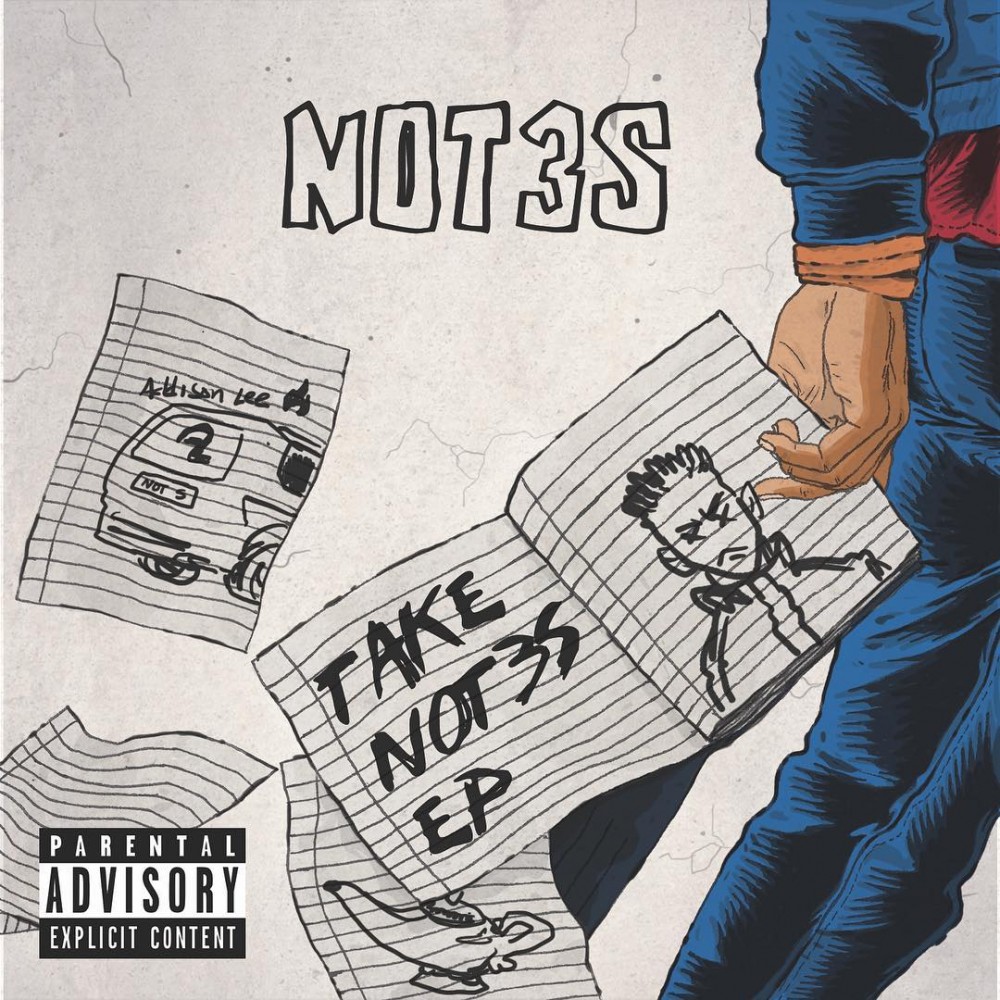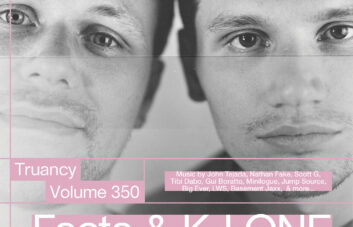Not3s is best known for improbably catapulting London cab firm Addison Lee back to relevance in the age of Uber. His hilariously catchy debut, “Addison Lee”, went viral, even earning some thoughtful critique from Louis Theroux. This week, he released his debut EP Take Not3s, which announces what those who were paying attention to him had already garnered: he is one of the most polished young vocalists in the UK right now. The EP contains all his previous hits, as well as brand new collaborations with Tinie Tempah and Mostack.
Not3s’ vocal confidence is immediately noticeable. His most impressive attribute is the fluidity with which he shifts between rapping and singing, even within the same verse. His range is best displayed on “Alladin”, where an austere, piano-led beat that could leave a less talented vocalist exposed instead affords him the space to shine. His autotune-drenched declaration, “I’m the golden child in this ting, when they’re talking about Hackney,” illustrates his unfettered belief in his own ability. Elsewhere on the EP, “99+1” with Mostack is a charmingly lackadaisical piece of hip-hop and “Hasta La Vista” sees Not3s comfortably moving into more dance-oriented territory. Finally, “Addison Lee” is of course there, two tracks in, sticking two fingers up to Uber with a broad grin on its face.
Free-flowing and accented by sharp distortion, the intro to ISSHU’s Bloc on SEAGRAVE is like an experimental overture: while lacking in structure, its emotive quality sets the tone for the rest of the album. This expressive approach is present throughout the UK-based producer’s works, reflected in the use of muffled vocal samples, uncommon rhythms and frequent sparseness. Despite the diversity of sound on Bloc, a strong sense of mood purveys throughout, floating somewhere between the upbeat energy of “Halosaur” and ominous unease of “DDR”. Dominated by percussion and enhanced by 8-bit synths, “Rawe” and “Tesla” are bewitching and groovy at once. The intoxicating “6am Fade Out” channels the disorienting moments of entering sunlit streets after hours in the dark. A barking dog in “Howl” is jarring, yet the track’s repetitive nature and hazy quality make for an dreamlike atmosphere. The latter part of the album delves deeper into experimentation, abandoning most of its melodic serenity for percussive foreboding. While ISSHU’s production style particularly shines on songs “Criterion” and “Akai”, which strike a delicate balance between raw and polished, his unique style and willingness to toy with structure make every composition on Bloc worth exploring.
Little introduction is necessary for Ty Dolla $ign, one of LA’s finest musical exports to the rest of the world. His Beach House series is named in tribute to an aspiration of success he’s held onto since childhood, when his family would visit a beach on which they’d plan to build a home. Beach House 3 matches ambition with achievement and sees the artist aiming for every target. There’s the John Mayer intro, the lilting pop of “So Am I” ft. Damian Marley and Skrillex and an after-hours anthem in “Droptop in the Rain” with Tory Lanez. The two highlights that warrant constant reloads feature artists Ty Dolla has established special chemistries with – YG and Jeremih respectively. “Ex” is the track with the former, repurposing the eternally smooth Bad Boy remix of 112’s “Only You” for today’s systems. From the unshakeable bassline to YG’s flow, there’s plenty of nods to the classic though the spotlight is always on Ty Dolla $ign’s melodic magic. It’s always special when Ty Dolla and Jeremih get together, “Impatient” and “Paris (Who Taught You)” being standouts on their own albums. Jeremih’s raspy guest spot is rapped between exaggerated gasps to match the flaunts and flexes of “Dawsin’s Breek”. Ty Dolla struts and glides over the ambling beat with the confidence of a person stepping out the pad in a fresh new pair of kicks (Vans, knowing the artist). “Drop top freak, and she flossin’”, he croons, christening the track: “Ice on creek, like I’m Dawson.”
Afriqua is an artist who keeps to himself. The Berlin-based Virginian has made hip-hop and house, his minimal tracks finding their way into sets by the likes of Raresh and Move D. His background is classical, and this grounding in piano comes through on the gorgeous keyboard melodies on Aleph, his first release on Belgian powerhouse R&S. Opener “Aleph” is a free-flowing groove that’s urgent without being rushed. Light whirls on the Rhodes add a touch of airiness to the track, offset against the ongoing thud of beats. That keyboard work is the backbone of this release, setting these tracks apart from any of Afriqua’s contemporaries. Floating Points springs to mind, but his work is often more studied and deliberate, while this release feels looser, more natural.
“Sent” is a different piece entirely. It sounds like 1960s radio scribbles and droning ambience with broad strokes of keyboard painted on top. The combination is intriguing, a mix of radiophonic noise and jazz that feels perfectly natural. “Opferator” builds endlessly, a simple repeated bass line driving forward as steady kicks land at the open and close of every bar. Keys dance, pads go wah and expectation abounds. The journey is itself the destination. Lastly, “Thanksgiving” returns to straight-up four-to-the-floor. Melancholic twangs hover between beats, while a scuzzed-up bass line takes centre stage. Once more, a strange combination adds greater warmth and substance – in this case a mix of deep house tropes with soft squawks of noise. Aleph is said to precede an album, among other things. These early signs promise a rich and enlivening body of work to come.
Words by John Hardy, Taylor Trostle, Tayyab Amin and Aidan Hanratty.



